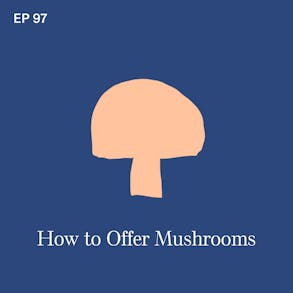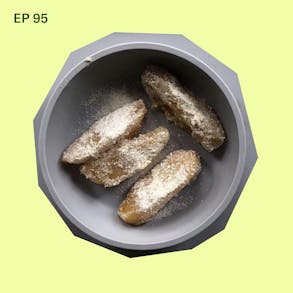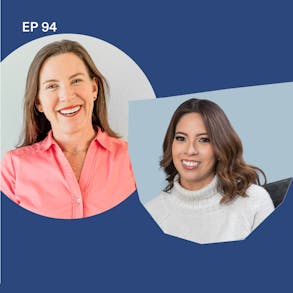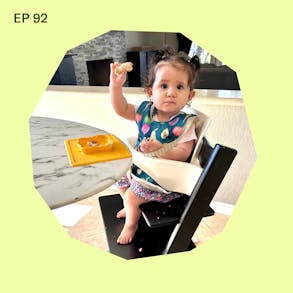What Type of Oil Should I Use for BLW?
- When babies can start having foods cooked with oil
- What type of oils that you already have on hand work for BLW
- Why adding fat to foods can help make BLW safer and tastier

LISTEN TO THIS EPISODE
Episode Description
Is it ok to use oil when cooking for your baby? And what type of oil is best? In this episode we are exploring added fats for babies who are just starting solid foods. Oil is important for your baby’s brain health, for providing energy and it can help lubricate certain foods to make them safer to swallow.
Links from This Episode
- Baby-Led Weaning with Katie Ferraro program with the 100 First Foods™ Daily Meal Plan, join here: https://babyledweaning.co/program
- Baby-Led Weaning for Beginners free online workshop with 100 First Foods™ list to all attendees, register here: https://babyledweaning.co/baby-led-weaning-for-beginners
Other Episodes Related to this Topic
- Episode 177 - Red Meat Your Baby Can Safely Eat
- Episode 178 - White Meat Your Baby Can Safely Eat

Latest Episodes






Katie Ferraro (0s):
Hey guys, Katie here real quick. If you need to stock up on feeding gear for your baby EZPZ is having a huge back to school sale. You can get 25% off everything at EZPZfun.com using my affiliate discount code BLWSCHOOL. So my regular code, Katie10, it only works for 10% off, which is nice, but this bump up to 25% off everything with the code BLWSCHOOL is awesome. If you're stocking up, I always think it's kind of funny to have a back to school sale for baby feeding gear, cuz babies don't go to school, but EZPZ does they make feeding gear for babies, toddlers, and now bigger kids. So If you have a baby, it's the EZPZ, tiny line, which makes the silicone suction mats and bowls and cups and spoons for your baby six to 12 months. And then you size up to the EZPZ mini line, which are utensils and cups for babies who are one year or older.
Katie Ferraro (46s):
But now they've got this happy line for kiddos two years and up, and I've been using the happy line, a ton in my own house with my seven kids. They're all stoked about the EZPZ bigger kids stuff. Again, get 25% off everything with the code BLW school. And that runs now through Thursday, August 18th. So the benefit of fat extends even well beyond mouth feel and the provision of nutrition, right? Offering fatty foods like those fatty cuts of meat, when that fat liquefies and it lubricates the protein strands of the met, it's actually making it safer for your baby to swallow. Hey, there I'm Katie Ferraro, Registered Dietitian, college nutrition professor and mom of seven specializing in BABYLED weaning here on the baby Led Weaning Made Easy podcast.
Katie Ferraro (1m 28s):
I help you strip out all of the noise and nonsense about feeding, leaving you with the confidence and knowledge you need to give your baby a safe start to solid Foods using BABYLED Weaning. Hey guys, welcome back today. We're talking about fat and in particular, what type of oil is best for BABYLED Weaning? Now, when it comes to fat, fat sometimes gets a bad rap, but there's absolutely no reason to fear fat. And in fact, we want to be adding fat to our baby's foods for a couple of reasons. So hang tight in today's episode, I'll be sharing what my favorite types of fat are and how I use them when cooking for BABYLED Weaning.
Katie Ferraro (2m 10s):
Now, what is the benefit of having added fat in your baby's foods? As you guys know, when you start out with solid Foods, there's very little actual eating that's going on. There's babies need a lot of time to learn how to eat, but it's a good idea for us to get in the habit, adding the right sort of nutrition to our baby's food and fat is very important for your babies still developing brain. So we are first interested in offering fat for a brain health standpoint, but also fat is important from a safe swallowing standpoint, especially when we're talking about foods that have a tendency to be more on the dry side, certain cuts of Meat or certain types of whole grain Foods, adding fat actually equates to increased moisture in the food.
Katie Ferraro (2m 54s):
So fat, especially in the sense of protein. Right? Think about, let's talk about some sort of a Meat product. Maybe you're serving your baby, some kind of a shredded pork, okay, you're doing a pork butt or a pork shoulder roast. If you are adding additional fat and that's actually a fatty cut. So we don't even need to add fat to that. So the, If you pick the fattier cuts of Meat, when they have the fat in there that fat, when you cook it and it liquefies that liquid fat lubricates, the protein strands of the Meat and actually provides more moisture, making it easier and therefore safer for your baby to swallow foods like meats, for example, and whole grains. So fat can help us from a brain health standpoint, fat can help from a safe swallow standpoint.
Katie Ferraro (3m 36s):
And then from a nutrition standpoint, we know that fat is a very important source of energy or calories. Okay. Fat is very energy dense, meaning in a very small amount of food. It provides a lot of energy and early on, that's not really that important because of course baby's gonna be getting most of their nutrition from breast milk or formula, but as your child becomes more proficient in feeding themselves, they're gonna, as weaning takes off, they're gonna be getting more nutrition from food, getting less nutrition from Infant milk. And we wanna make sure that we're getting that appropriate mix of fat and carbohydrate and protein from Foods. So what sort of fats work well for BABYLED Weaning to start this part of the conversation off. I just wanna let you know, there's no wrong fats, whatever fat your family uses in your house can very likely work well for BABYLED Weaning.
Katie Ferraro (4m 23s):
So don't feel like you need to go out and buy a special type of fat. And in fact, you know, take a look in your own pantry in your own cabinet at your own kitchen. You know, what sort of fats and oils are you already using? Sometimes people ask about butter. I definitely will use butter for BABYLED Weaning with two caveats there. Always go for unsalted butter, right? Because our goal is to minimize added salt and sugar. And then I also wanna make sure that the baby's already been exposed to cows milk protein, a number of times on their own, without reaction before I'll start mixing butter into lots of Foods, right? Because butter is a dairy food with the cows milk protein, which is a potentially allergenic food. It's fine for babies to have. We want baby to get exposure to that protein early and often.
Katie Ferraro (5m 3s):
But we do just wanna remember to kind of take a little bit of caution when we're introducing new foods. When it comes to the allergenic foods, we wanna build in a little pad there to observe for any potential reaction. And that mention of the dairy consideration. That's really only applicable If you you're exclusively breastfeeding, because of course, if you're feeding formula, your child's already been exposed to cow's milk protein, you know, they're not allergenic to it. So go ahead and have some fun with that butter, if you want. Now, as far as cooking oils go, there's a few oils that if people are like, well, I don't have any oil in my house, which one should I buy? I love avocado oil for BABYLED Weaning for a number of reasons. Okay. Avocado oil has a very high smoke point. You know, probably notice we end up kind of frying a lot of foods, especially whole grains into little fritters that we can cut into strips that babies can pick up and feed themselves.
Katie Ferraro (5m 49s):
What sort of oil do we use for frying? I like one with the highest smoke point that doesn't get accurate or it's not gonna burn. And avocado oil is a great one it has one of the highest smoke points, avocado oil and peanut oil for smoke points are my two preferred oils. Other benefits of avocado oil. There's the high smoke point. There's also a very mild flavor profile. It's not overwhelming. So your baby's learning to taste the flavor of the food and not the fat. In addition to that, I like avocado oil because it's got a nice, healthy fat profile, right? It's primarily unsaturated fats. And I don't want you to be splitting hairs over how much saturated and unsaturated fat your child's having, but it is a good idea to tend towards the more unsaturated fatty acids, long term from a heart health standpoint, we know that those are more beneficial than the saturated fatty acids.
Katie Ferraro (6m 30s):
So I love avocado oil. I do like peanut oil also for frying. I'll use any of the other unsaturated fats. I like olive oil. If I'm just cooking, you can't use olive oil, of course, in every application, whatever, If you are using corn oil or If you you're using, you know, any of the different sorts of oils really can work well for BABYLED Weaning. If you're already using them in your household, I do get a lot of questions about coconut oil. You know, there was a period there, not so much recently, but I would say 5 or 10 years ago where coconut oil had this like massive, I would call it undeserved health halo where everyone thought coconut oil was like, I'm just gonna swather coconut oil on all my food. And now I'm super healthy. And coconut oil is primarily saturated fat.
Katie Ferraro (7m 11s):
Okay. And we know that saturated fats have the tendency to raise our bad, the LDL cholesterol levels. Again, not so much a concern early on in infancy. However, we just don't want to get in the habit of offering tons of high saturated fat foods and having baby get accustomed to that. So a little bit of coconut oil in moderation, if you like the way it tastes or you would use it for other stuff, but I don't want you to think that there's any like added on health benefit from coconut oil because there certainly is not. Now when it comes to how much fat or can babies have too much fat? You know, if you're offering a variety of foods, okay. And I have a 100 FIRST FOODS LIST where we offer five different foods a week using my five step feeding framework. And each week we choose one new fruit, one new vegetable, one new starchy food, one new protein food, and one new allergenic food.
Katie Ferraro (7m 55s):
If you're doing that week in and week out. So five new Foods a week, 20 foods a month in five months, your baby has tried a hundred foods. You're naturally going to be gravitating towards a variety of different fatty foods, different protein containing Foods, different carbohydrate containing Foods. Oils are unique in the sense that they're 100% fat. There's not a lot of Foods that we offer that are a hundred percent fat, okay. Oil or butter basically. And having said that there's no other carbohydrate, there's no protein in there. And that's fine because baby could be getting those from lots of different sources, but we don't wanna be overly reliant on any one of the macronutrients. So we wanna keep, you know, kind of perspective here that if we're offering our baby a variety of Foods, they'll naturally be getting the appropriate amount of fat, but babies do have a very high fat needs.
Katie Ferraro (8m 39s):
Okay. The reason why, you know, cows milk is not appropriate as an Infant milk for babies less than 12 months of age is because it's even whole milk. It's just much too low in fat. Okay. And thier their stomachs are really tiny. We need to use that energy from a, a very fat dense source, like breast milk or formula, but then as your child transitions out and you're introducing foods, we do do a variety of carbohydrates, fats and proteins, and oil is one way that we can help your baby get some of that fat. Also make the food a little bit safer, certainly a little bit tastier. It also helps with some different cooking applications. So I hope you now feel a little more equipped to offer your baby variety of different oils when you're making foods for BABYLED Weaning.

The Program Baby-Led Weaning with Katie Ferraro
A step-by-step digital program for starting solid foods safely and navigating the original 100 FIRST FOODS™ meal plan with baby-led weaning.
 EXPERT-LED, PROVEN APPROACH TO EATING REAL FOOD
EXPERT-LED, PROVEN APPROACH TO EATING REAL FOOD CONCISE VIDEO TRAININGS TO MASTER BABY-LED WEANING
CONCISE VIDEO TRAININGS TO MASTER BABY-LED WEANING 100 FIRST FOODS DAILY MEAL PLAN WITH FOOD PREP VIDEOS
100 FIRST FOODS DAILY MEAL PLAN WITH FOOD PREP VIDEOS
Baby-Led Weaning for Beginners Free Workshop
Is your baby ready to start solid foods, but you’re not sure where to start? Get ready to give your baby a solid foundation to a lifetime of loving real food…even if you’re feeling overwhelmed or confused about this next stage of infant feeding.
Get baby-led weaning recipes and tips delivered to your email inbox.

